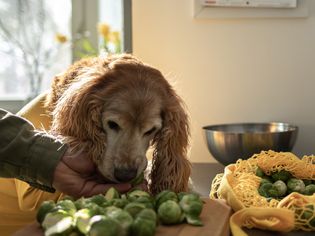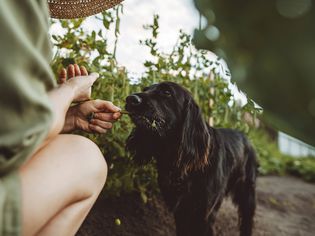Just like us, dogs can eat pears. The sweet fruit can serve as a healthy, tasty snack for our canine friends. You just have to make sure your dog doesn't eat too much, and don't forget to avoid the toxic seeds.
But before you start filling your dog's bowl with pear slices, read what Florida-based Alejandro Caos, DVM with The Vets, has to say about pears for dogs. He has tips on nutrition and safety that can guide your decision making.
When Can Dogs Have Pears?
Generally speaking, pears are safe for dogs, Caos says. There's just one area of the fruit you need your dog to avoid: the core with seeds.
Those seeds release cyanide, which is toxic to dogs (and us, for that matter). Your dog eating one seed probably won't cause long-term damage or death, but it's still better safe than sorry. Make sure any pear you feed your dog is free of seeds. Also, the core can be a choking hazard and should not be fed.
Next, don't feed your dog too much pear. They can be a healthy snack—more on that later—but you don't want to feed your dog too much of the sugary fruit. Why? In large amounts, sugar can lead to weight gain in dogs, which then opens the door for heart, respiratory, and joint problems.
Nobody wants that, so talk with your veterinarian about how much pear to offer your pup. The right amount for your dog is different than it is for every other dog. (In most cases, larger dogs can consume more than smaller pups.) Start small, and make sure your dog doesn't choke.
"Practice common sense," Caos says. "Cut those things into small pieces. Make sure they enjoy it without any hazards."
Are Pears Good for Dogs?
Pears can be great for dogs when they eat the right amount because they're "chock full" of nutrients, Caos says. That includes vitamin C, potassium, copper, and plenty of fiber. Vitamin C is a valuable antioxidant for dogs while potassium helps keep the kidneys and heart running regularly. Copper creates red blood cells and builds skin.
The fiber, which can harden stool and maintain gut health, especially makes pears a great treat for overweight dogs, Caos says. If your pup enjoys the fruit, pears are a lower-calorie replacement for a dog cookie or biscuit.
"They act as an excellent treat," Caos says. "It's a good enrichment and bonding mechanism to feed high-reward treats."
Naturally, your dog has to enjoy pears for them to work as a treat. If not, you may need to try something else.
Risks When Dogs Eat Pears
Again, pears are generally safe for dogs, but problems can arise if your dog eats too much or consumes the seeds. That could happen if your pup snags an entire pear off your counter while you were gone, for example.
If you're worried about your dog's pear consumption, Caos recommends consulting or calling the ASPCA Animal Poison Control Center. That's a surefire way to talk with a veterinary toxicologist.
Otherwise, keep a close eye on your dog. Caos says general signs of canine poisoning include:
The cyanide-filled seeds, meanwhile, can cause anemia, Caos says. Anemia occurs when your dog's blood lacks enough oxygen. A dog with anemia may exhibit signs such as lethargy and lack of appetite, but Caos says bloodwork is usually necessary to provide a definite diagnosis.
Remember, though, your dog would likely need to consume more than just one seed to get sick.
If you have any questions about your dog eating pears, talk with your veterinarian. They know you and your dog and can provide the best guidance.










Comments on " Can Dogs Eat Pears?" :